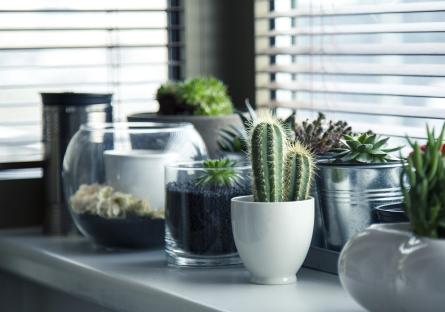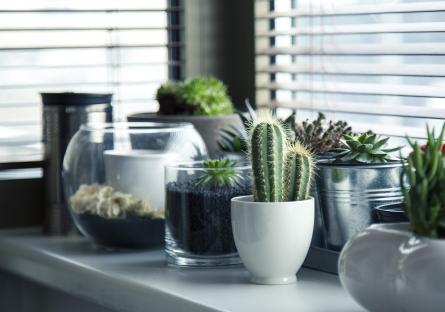This article appears for archival purposes. Any events, programs and/or initiatives mentioned may no longer be applicable.


Audrey Hepburn once said, "To plant a garden is to dream of tomorrow." Embracing the art of horticulture—cultivating and caring for plants—is an act of responsibility and optimism, much like adopting a pet. You’re committed to taking care of a living thing, so you have to picture a long string of tomorrows on the horizon to take that leap. If you live in an apartment, condo, or other shared space where you can’t keep a garden, don’t despair: you can still bring a little green into your life by getting a couple of houseplants. Not only will houseplants enliven your surroundings, they can also provide benefits to your health and mental wellness.
Cleaner Air
One advantage to having more lush greenery in your home is that indoor plants can help purify your air. While research into the efficacy of houseplants as air purifiers is ongoing, there are promising results that show that houseplants can soak up and clean volatile organic compounds (VOCs). VOCs are pollutants that many indoor objects like paint, carpets, and even printer inks can give off. These pollutants can build up in the air over time and irritate your eyes and skin, trigger asthmatic reactions, and make it harder to breathe indoors. Some plants like orchids, succulents, and epiphytic bromeliads can absorb carbon dioxide and release oxygen.
Stress Reducer
Studies have found that the act of caring for indoor plants can reduce both mental and physical stress in the body. Interacting with houseplants can induce feelings of comfort and improved well-being. There is a sense of belonging we feel in nature that also occurs with houseplants, which triggers physical effects in the body by suppressing our diastolic blood pressure and sympathetic nervous system activity. The color green also has an important role to play in this as it is a color that often has a calming effect on people.
There is even research that indicates that plants can play a therapeutic role in recovery. Hospitalized people who have a view of plants or trees tend to be calmer while recovering and have better clinical outcomes, including a reduced need for pain medicine compared to those who weren’t exposed to plants.
Improved Attention
Do you work or study from home? A few houseplants near your desk could improve your ability to stay focused. Scientists have found that when people are exposed to plants and other natural environments their attention tends to be sharper. When you feel exhausted from staring at word docs and spreadsheets, stare at your potted plant for a minute or two. You may find the experience to be surprisingly restorative and your concentration renewed by admiring some greenery for a few minutes.
Mood Booster
Houseplants aren’t just a stress reliever: they can also improve your mood. Studies have found that being around houseplants for less than 20 minutes can make people feel happier and more positive than they would feel in other surroundings. Plants don’t just add a pleasing pop of color to your home; they can also brighten up your inner landscape.
Low Maintenance Horticulture
As we talked about in our previous Wellness Wednesday piece on gardening, caring for plants can be a deeply rewarding hobby. It can be difficult to do without a front or backyard, which is why houseplants can be an easy and cost-effective way of bringing some wildlife into your home. Cacti, aloe vera, bonsai, potted flowers, spider plants, Devil's ivy, philodendron, lilies, and herbs like basil and mint are very popular options. Most of them require very little watering and only minimal trimming and upkeep.
Two things to keep in mind with houseplants is that some plants can be poisonous to pets. The other concern is that houseplants could attract pests, so it’s always a good idea to keep an eye on both the plant and the soil it's in to make sure it is not becoming infested with unwelcome pests.
Article by Austin Brietta
Want more wellness tips? Check out these stories: